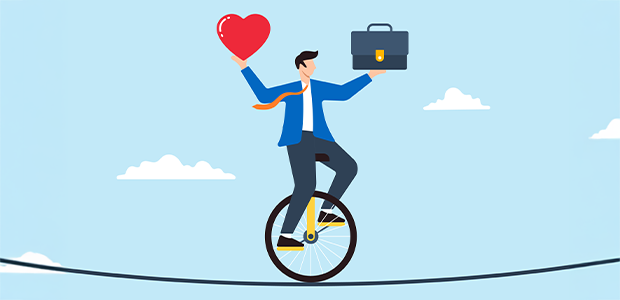
How to manage stress and perform while launching multiple businesses
Every founder has heard it: “You’re taking on too much.” Yet, in the rush of launching multiple ventures, it’s easy to brush off warnings until the consequences hit.
Drawing from my experience as a professional athlete and serial health entrepreneur. I've created effective stress management strategies that extend beyond simple survival, and you can adopt them as well – here you go!
Understanding stress as performance feedback
Stress is a predictive aspect of innovation, particularly when juggling several projects or ventures. Typically, this involves high stakes, increased responsibilities, and uncertainties that generate a great amount of pressure. But have you ever viewed stress as a sign of performance, rather than merely a physical response?
Recent research, together with my previous experience, indicates that stress requires strategic management. In other words, persistence alone is no longer sufficient. For instance, when I experience anxiety or fatigue, I reflect: What is this indicating? Am I overlooking essentials like rest, nutrition, and exercise?
As I often remind others, “95% of the things we worry about never happen. And if they do, we often can’t control them anyway.” So, use stress signals as performance data. Look in detail at factors like workload, wellness, and resources whenever you notice increased pressure or declining efficiency.
System over chaos: the biohacker’s mindset
While “biohacking” has become a buzzword, at its core, it's about methodically improving our mental and physical capabilities through well-established, easily accessible wellness protocols. Even with a professional sports background, I found myself facing performance barriers, including brain fog, a decrease in physical well-being, and low energy levels.
The pivotal moment, however, came when I started monitoring performance, applying the same rigour I use in business operations. So, I began tracking metrics for sleep quality, vitamin deficiency, nutrition, and physical activity. This was the time when I saw improvements in my cognition, decision-making, and overall performance.
I also base my daily routine on four key, time-tested elements that I’ve personally found effective. First, a healthy night’s sleep, with about 2.5 hours of deep sleep. To achieve this, I make sure to stop eating 3-4 hours before bedtime and keep the room temperature at an optimal 19°C. Lately, I’ve also been experimenting with a growing trend – taping the mouth shut at night to ensure proper nasal breathing.
Exercise is also essential, but it should never be exhausting. I prioritise proper rest and recovery between workouts. And if structured workouts don’t fit into your day, simply adapt your physical activity to your lifestyle.
And of course, if you can incorporate ice baths into your routine, they’re a powerful way to strengthen your body and build resilience to stress.
Cortisol and intervals: why you can’t be ‘on’ all the time
In entrepreneurial circles, many believe that always giving 100% is the key to success. But interestingly, research tells a different story. According to the article, published in Frontiers, working non-stop at full intensity can actually lead to clouded thinking, lower motivation, and even have adverse effects on physical health.
And that’s true – even top athletes don’t push themselves to the max every single day. In fact, professional athletics offers valuable lessons about performance optimisation: elite athletes deliberately include recovery periods. This principle applies equally to mental and physical performance. I frequently remind my team and myself, “Your body needs intervals. Push hard, then recover and push again. That’s how you grow stronger in business and life.”
Mastering the mindset: a core skill for entrepreneurs
Cultivating the right mindset should be considered a fundamental skill for every entrepreneur. Multiple studies confirm that entrepreneurs who maintain psychological wellbeing tend to perform at a higher level. Why? Because they’re equipped with deeper emotional and mental reserves, allowing them to stay the course, make clearer decisions, and navigate setbacks more effectively.
The first step is learning to focus only on what you can control. Too often, energy is wasted on factors beyond our influence – a mental drain that slows momentum. The second is adopting visualisation techniques. I learned this during my career as a professional basketball player – because the game is as much mental as it is physical.
Over time, visualisation became a habit I carried into the business world. Whether I was preparing for an investor pitch, navigating high-stakes decisions, or visualising the early stages of building Bioniq, the practice of mentally rehearsing outcomes made me more confident and grounded.
It’s just as important to rethink how we measure success. Your self-worth shouldn't hinge on a single milestone or headline-making achievement. Instead, it’s built over time – through personal growth, quiet wins, and moments that often go unnoticed. Sometimes, we need to step back and recognise how fortunate we already are: being healthy, having a family who is still around – these are all incredible foundations, and they matter just as much as any professional accomplishment.
With that perspective in mind, it becomes easier to approach entrepreneurship with greater balance. Running multiple businesses is challenging, no doubt. But the most sustainable path is one that prioritises mental clarity and well-being. The best practice is to be attentive to your body, mind, and health, as well as be honest with yourself about how you're feeling. Success comes from finding the right rhythm, knowing when to push forward and when to pause. After all, resilience isn’t built in overdrive, but in the spaces where we rest, reflect, and reset.
For more startup news, check out the other articles on the website, and subscribe to the magazine for free. Listen to The Cereal Entrepreneur podcast for more interviews with entrepreneurs and big-hitters in the startup ecosystem.

